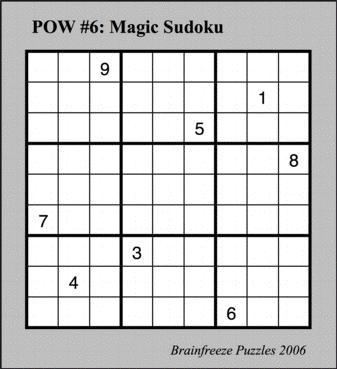
Rules: Fill in the grid so that each row, each column, and each 3 x 3 block contains the integers 1, 2, 3, 4, 5, 6, 7, 8, and 9 exactly once, AND so that each of the nine 3 x 3 blocks is a magic square.

As usual, there are two natural questions to ask: How many Sudoku boards have this "all-magic" condition? And, what is the smallest number of initial conditions that will guarantee a unique solution to an "all-magic" Sudoku puzzle? The magic squares condition is very restrictive (as you will notice by inspecting the solution to the puzzle above), so there aren't many Sudoku puzzles with this property. And obviously, as the example above shows, way less than 18 symmetric conditions are needed to determine a unique solution. Can you find a smaller initial condition set than the one above? Finally, what if the magic squares are also assumed to have the diagonal condition? Are there any Sudoku boards possible under those conditions?
Solutions are due by noon on Tuesday, February 21, 2006.
Return solutions ON PAPER to Laura Taalman, Burruss 127, MSC 7803.
Include your name and email address with your solution.